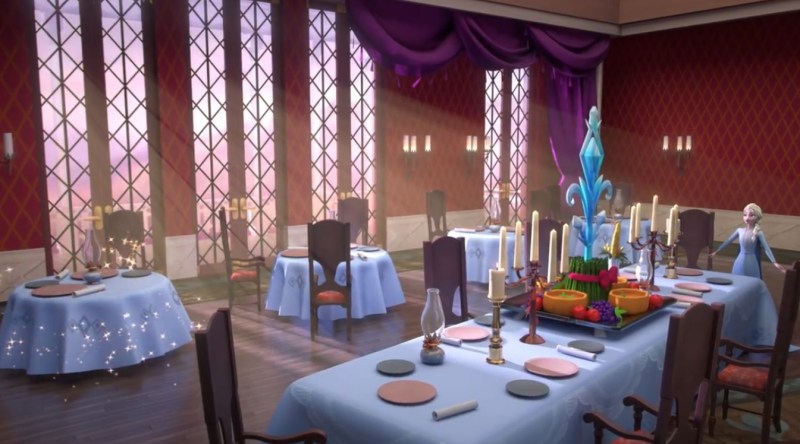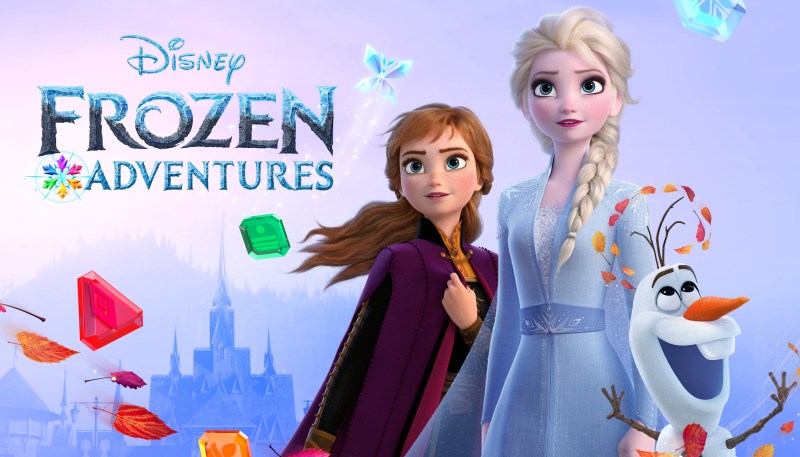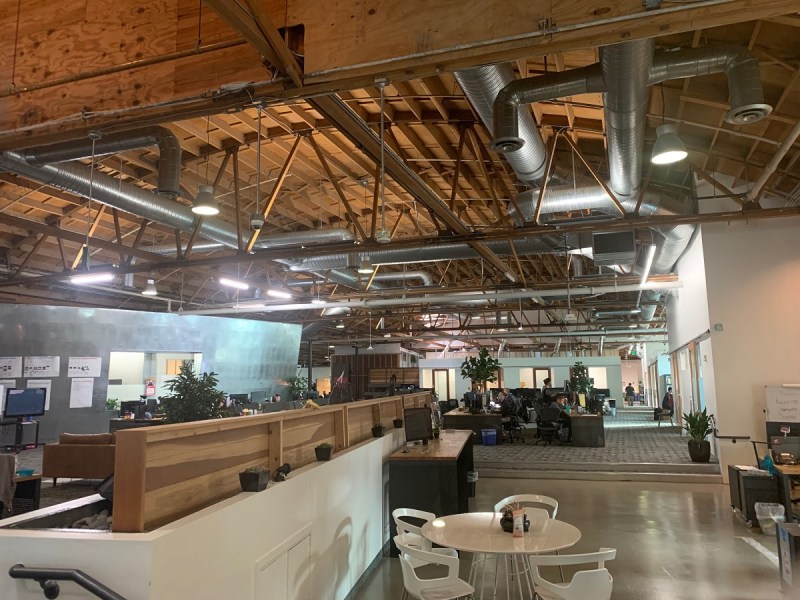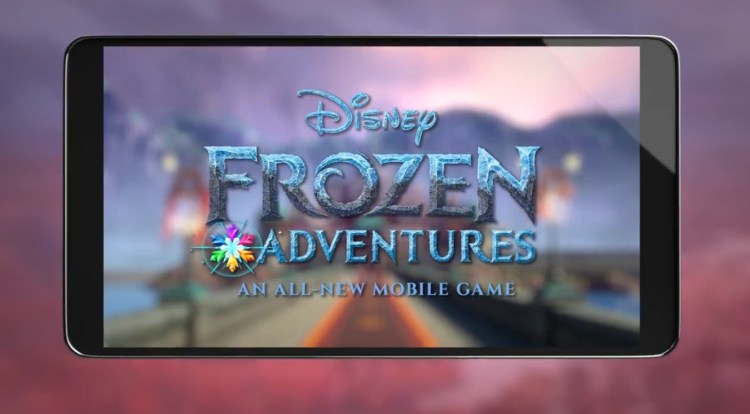Jam City is one of the big survivors in the mobile game business, and it has a big presence in the Culver City area of Los Angeles. That proximity to Hollywood gives it an advantage as it pursues licensed game deals and collaborations.
Jam City is launching Disney Frozen Adventures today on iOS and Android, ahead of the November 22 debut of the Frozen 2 movie, what should be one of the biggest blockbusters of the holiday season.
CEO Chris DeWolfe struck a multiyear collaboration with The House of Mouse which included Disney Emoji Blitz as well as the team that formed the core part of the Frozen Adventures development team. I spoke with him about this deal, the effort that went into making the Frozen Adventures game, and the dynamics shaping the relationship between Hollywood and games today.
Jam City scored first with big mobile titles. Cookie Jam has generated more than half a billion dollars, and Panda Pop has more than 120 million downloads to date. Now it is using that position to become an important partner for Hollywood companies in mobile games.
June 5th: The AI Audit in NYC
Join us next week in NYC to engage with top executive leaders, delving into strategies for auditing AI models to ensure fairness, optimal performance, and ethical compliance across diverse organizations. Secure your attendance for this exclusive invite-only event.
DeWolfe believes Jam City is poised to take advantage of the shift in Hollywood to focus resources on licensed deals and partnerships with established game companies.
Here’s an edited transcript of our interview.

Above: Chris DeWolfe is CEO of Jam City.
GamesBeat: Are you looking forward to Frozen 2?
Chris DeWolfe: I’d say the year in general has been one of building and integrating companies. Jam City Berlin, Jam City Toronto … are all hitting all-time highs in revenues over the lifetime of their games in the last quarter, which has been great.
Generally, Toronto and Germany take us into genres that we weren’t in before. What we loosely call parlor games — solitaire, mah-jongg, bingo. Both of those studios have done great. When we [absorbed] the Disney studio, which was in Glendale and is now in Burbank, it was their top casual game studio. They had an amazing game, Emoji Blitz. It’s about four and a half years old now, but have it growing and again hitting the highest revenues ever in this last quarter.
That same team is making [Disney Frozen Adventures]. It’s going to be launching in conjunction with the movie. We’re super excited about it, because it’s really authentic to the movie. It follows a lot of the same storylines, the same design, obviously the characters, decorations, interior design, costuming, music, all those kinds of things. We want to make it feel like, in some ways, an extension of the movie, but really put the user in control. We also wanted the fun of a match-three mechanic. It’s a match-three game that takes place inside the Frozen world.
https://www.youtube.com/watch?v=KmywcQNqTuE&feature=youtu.be
GamesBeat: Is there a guess as to what would help this one take off, the way the first movie took off? It seems unpredictable. Nobody guessed that “Let it Go” would be so popular.
DeWolfe: That was six years ago. There’s massive pent-up demand for anything Frozen. We all remember the song. All of our kids were singing it. Any store you went into, someone was singing it. Halloween costumes, that whole year. There hasn’t been any real major project around Frozen that’s come out since then. But there’s a real devotion by Disney to the IP and growing it out into a franchise. Thus, you get us doing the game and them doing the new movie. Yesterday the Disney stores filled up with Frozen merchandise.
GamesBeat: And you have former Disney developers to make the game.
DeWolfe: Right….The other interesting thing about the IP is that–there are as many parents watching the movie over and over again, even without their kids. If you think about six years ago, the kids that were 10 to 12, they’re now young adults. They’re 18 or 19. There’s all these different demographics that are going to be going to the movie and wanting to play the game and interact with different IP and the brand in general.
We think we’ve done a great job in nailing the brand and the fandom that comes along with Frozen. We’re really excited. There’s no bigger IP out there right now.
GamesBeat: Its only competition is Disney’s own franchises, like Star Wars.
DeWolfe: Which is a completely different IP. The great thing about Frozen, we have the only game that’s coming out. Some other IPs can get a bit crowded. You have to spend more time thinking about differentiation. For this one, it was wide open. This is the Disney Frozen game that’s accompanying the movie….With the team that we have on the game, we’re very confident in how well it’s going to do.
It’s perfect for the demographics, and there are multiple demographics for it. There’s older teenagers. There’s young adults. There’s moms and their kids. We’re localizing it everywhere. In terms of going big on specific marketing programs, it’s just Japan and the U.S., though. Frozen is very popular in Japan. There was an initial Frozen match-three game that did very well in Japan. It’s still around. We went the extra mile to make sure it was localized perfectly in every way.

Above: Disney Frozen Adventures is a match-3 game.
GamesBeat: Will you be going to China at the same time?
DeWolfe: China is tough because we don’t have a licenser to release the game. Some people just release on iOS, but we haven’t done that, especially with an IP like Frozen. We would never do that. Eventually we’d like to take every game into China. We’re waiting for licenses on a couple of our games.
Everyone’s having the same issues. We’re waiting to see if everything gets sorted out or not. If you look at other parts of the media landscape, they allow a certain number of movies into China. If you happen to win that lottery, it’s all gravy, but there’s nothing you can do to guarantee that your movie is going to get seen in China. It’s not completely open. There are certain rules that are a little bit undefined.
GamesBeat: Are your teams mostly doing the games within their own studio in one location, or do you spread one game across a bunch of studios?
DeWolfe: A little bit of both. If you look at Frozen, for example, the majority of that game is done in our Burbank studio. We have about 80 people there. Certainly we outsource some of the art. Not the original art, but if there’s art that needs to be reproduced, there are different art shops in different parts of the world that we use. We have a big location in Buenos Aires that, for example, does the engineering on Panda Pop. They do level design for Panda Pop in San Francisco. The majority of the original art gets done in San Francisco, but then the rest of the art gets outsourced to a third party. It all depends on the game.
Harry Potter is almost all in-house. There’s a really big team on Harry Potter, because it’s a story-based game, and story-based games are very labor-intensive. You’re writing narrative and building animations. It’s very costly to crank out the content, and it has to be super top-notch, done by people who really understand the canon and the rules around the IP. The Toronto studio, likewise, most of the work is done within Toronto, and I’d say the same for Berlin.
I think you’ll see more and more outsourcing as it makes sense, because–it sounds really trite, but the mobile game business has gone so global from a quality perspective in the last five years. Five years ago a lot of people thought you’d have a much better chance if you’re in L.A. or San Francisco, but gosh, the quality of art coming out of China and different places in eastern Europe is fantastic, and honestly at much lower costs. It makes sense to have that core competency. You always need an art director, though. You always need someone drawing the originals and imagining things.
GamesBeat: I’m curious about Hollywood in general. I thought a lot about Chris Heatherly’s group ending at NBC Universal. He was describing something like a trend toward Hollywood circling the wagons around film, the core business. If you’re dipping your toe into other businesses, that’s the part that’s getting pulled back.
DeWolfe: I think a lot of it’s a function of everyone trying to chase after Netflix or adopt the Netflix model, where they have a direct relationship with the customer. In the mobile gaming business, we’ve been very fortunate. We’ve always had a direct relationship with the customer. We send them push notes or emails. We give them messages in games. We can cross-promote them into other games. If you’re just making content and running it through one of the networks or one of the cable channels, you never have that relationship with your customer.
There’s all these OTT services. All these media companies are getting so focused on the OTT services, making sure there’s the right content in those services, totally ultra-focusing on that. A mobile gaming business? Don’t bother me with that.
GamesBeat: Are you positioned to benefit from all this, do you think?
DeWolfe: We have a very long-term view with Disney. We’ll be making multiple games. We have a long-term deal with Disney, and no one has better IP and a wider variety of IP than Disney. It lets us go in a lot of different directions.

Above: Disney Frozen Adventures lets fans decorate their fantasy palace.
GamesBeat: What do you view as other possible expansion areas? Areas where you go outside of what you normally do.
DeWolfe: We’re working on a mid-core game right now in Bogota, which is a really fun game. It’s a really big swing for us. It’s in soft launch right now. We’re continuing to experiment with it. That’s very interesting. It lends itself to a different demographic, a more male demographic.
Harry Potter was a big jump for us, because it’s probably the most successful storytelling game of all time. It’s going to have a very long shelf life. We continue to grow that team. We’re really good at storytelling. We’re really good at casual, or I should say puzzle. Now we’ve moved into more of the parlour game area.
I think what we’re really looking for are great leaders and great teams. We’re willing to go into almost any genre that we think is reasonable with the right partners. I don’t think we would try to attack something like the 4X end of the industry with the folks we have here. We’d do it with a partner or acquire a company that had that expertise. Even with bingo or solitaire or mahjong, it’s not something that we would build in-house. Those guys know how to build those games. They’re leaders in their category.

Above: Disney Frozen Princess is available now on iOS and Android.
GamesBeat: With Disney, it seems like it’s more than they’re going with the partner that has a lot of traffic. They’re looking for someone in a particular area.
DeWolfe: It’s more expertise. They care more about their customer and their brand, because this Frozen brand is–even though they haven’t had a movie for six years, they’re very dedicated to it and devoted to it. It has to be right on the money.
[We worked really close in collaboration with the Disney Games team to understand the rules and to make sure we’re on point with the brand.]
Not everyone’s going to know how to do that. Not everyone’s going to know how to create a really fun puzzle game. Not everyone’s going to know how to tell great stories. We’ve proven ourselves in all of those areas.
We also have all of the requisite other services that are needed to grow in this industry: the financial means to do user acquisition, data science, big user acquisition teams, big creative teams. All those types of support teams where you can’t just farm it out to a work-for-hire shop, because you would always need that big infrastructure to support a mobile game, which we have.
Again, like what you said before, it’s the perfect match. We specialize in storytelling and puzzle. That’s exactly what this game is. We’re excited. Again, it’s been amazing building year. We plan to keep launching new games and continuing to make acquisitions. As you’ve seen, there’s been lots of consolidation, but there’s also great new companies popping up as well. Lots of opportunities.
We want to be more and more global as a company. We’ve seen firsthand how the Berlin acquisition has gotten us to think more globally. That office, for example, more than half of their employees come from a different country. It’s very parallel to the way Berlin is in general. The majority of people that live in Berlin came from a different country. It’s very cosmopolitan. Because of that, you have a very international perspective when it comes to localizing your game and getting everything right.
Now we’re at the point where we’re actually hiring people not only for the studio in Berlin, but we’re hiring people for Jam City corporate in that office, to do localization, and in the future even game design.

Above: Jam City’s headquarters in Culver City, California.
GamesBeat: Does Los Angeles still seem like a place where you have reasons to keep adding people here, versus all these expansions elsewhere?
DeWolfe: We have a hub and spokes organization. This is our hub. We have all of our central services here — finance, UA, data science, all of our backend tools, those kinds of things. We also have two studios in this building. Then we have two studios down in Carlsbad, where we do Cookie Jam and Cookie Jam Blast. They’ll probably be working on another game soon. Then Burbank and San Francisco, where they do Panda Pop and Harry Potter. Then Berlin and Toronto.
We’re on the video conference with them all day. Maybe twice a year all of the GMs will get together. But on a very regular basis, everyone gets together on a conference call. We’ll have an all-hands on a regular basis as well. The communication works out really well. From a game development perspective, we’re fine buying studios anywhere. Wherever the talent and team is–for us, the team is the most important thing.
It’s hard to find a team that works together in harmony. You have the engineers. You have the game designers. You have the artists. You have the product manager. The product manager’s thinking more about numbers and profits. The artist is thinking about making a beautiful world. The game designer is thinking about how you make that fun. When you can get all these people working together in harmony, it’s a very rare thing to find.
If we find that in Helsinki — there certainly seems to be a lot of that in Helsinki — we’d be happy to move into Helsinki. Berlin has been great. We’ll go anywhere. We think we’ve mastered the communication between our headquarters and all the different studio locations. But I must say, it is really nice being here in San Francisco, because we’ve been able to create close relationships with all of the IP holders. Not just Disney, but Warner. We work with them very closely on Harry Potter. Being able to see Google and Apple and Facebook and all the platform people on a regular basis. Being in California has its advantages from those relationship perspectives.
GamesBeat: It seems like Culver City is its own micro-hub now, too.
DeWolfe: It’s definitely becoming one. Amazon, Apple. We’ve been here for a while. Sony Pictures. It’s all springing up. There’s enough space to accommodate a headquarters. But it’s got a little bit of personality to it, unlike some of the suburbs where people are moving, where it’s just very sterile. I think companies like to move here because you get a creative environment like we have out here, versus a manufactured creative environment in a very sterile area.


